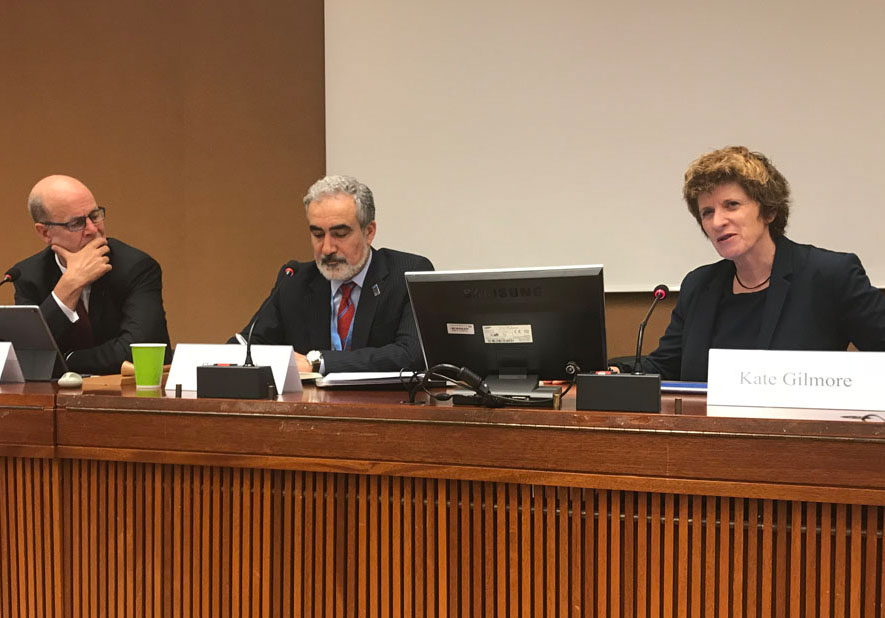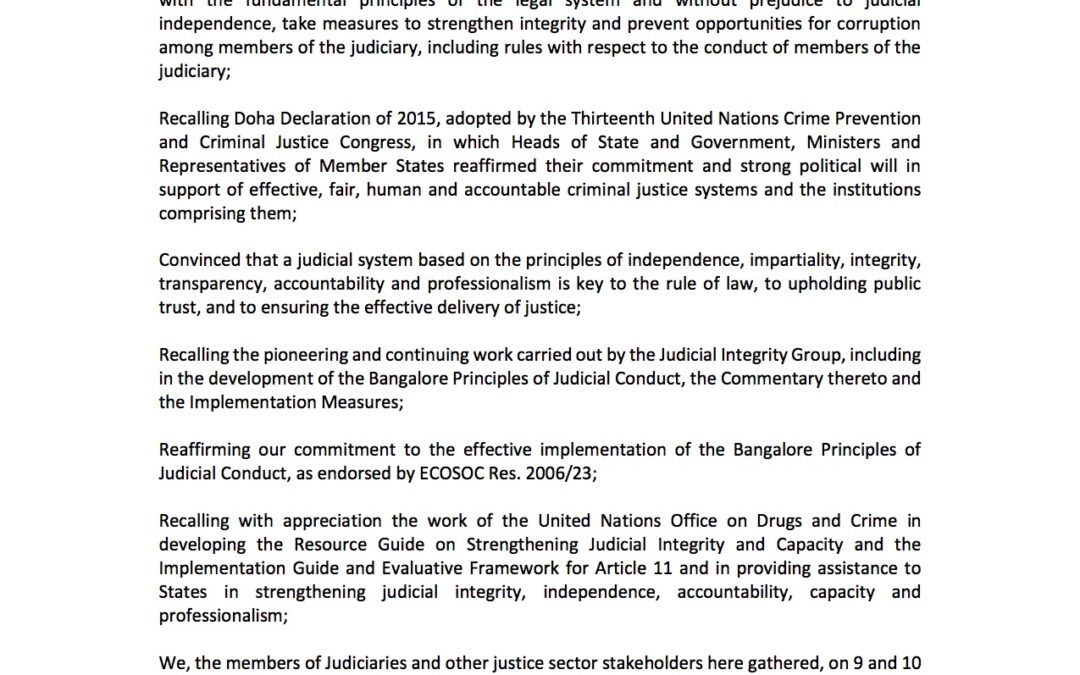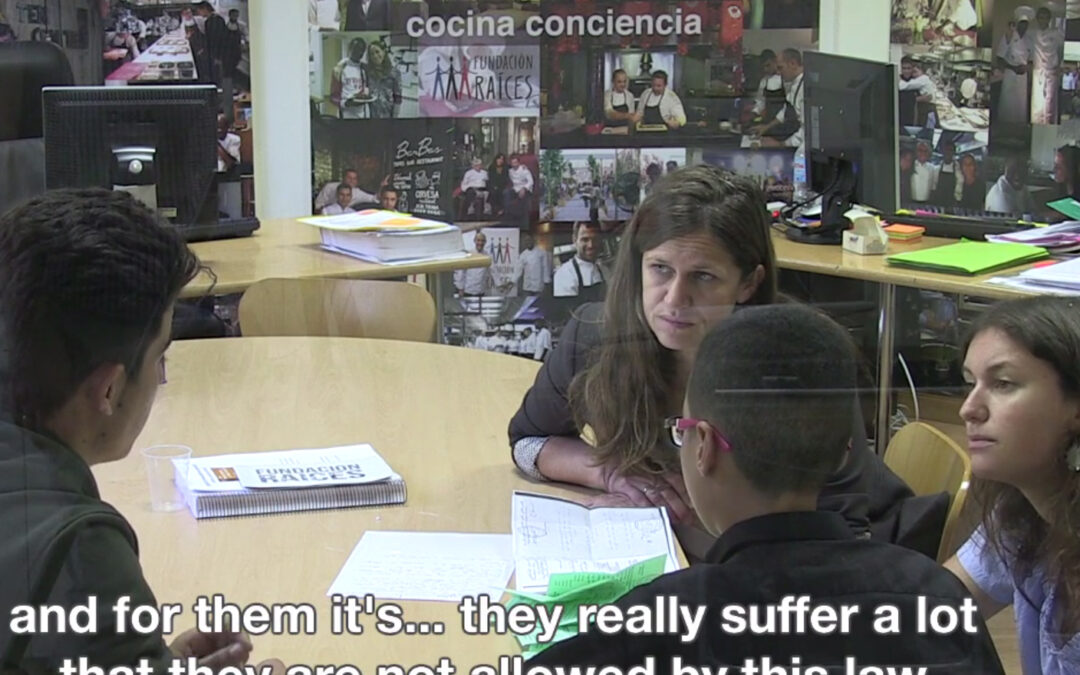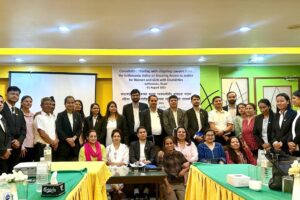
May 4, 2018
Hoy la CIJ lanza su informe Fuero militar y Derecho internacional: Los civiles ante los tribunales militares.
El informe analiza la cuestión del juzgamiento de civiles por tribunales militares, a la luz de los principios del Estado de Derechos y de las normas y estándares internacionales relativos a la administración de justicia y al derecho a ser juzgado por un tribunal independiente, imparcial y competente.
Asimismo, el informe aborda el desarrollo histórico y normativo, tanto a nivel internacional como nacional, del principio del juez natural o tribunal competente así como la prohibición de jurisdicciones especiales.
El informe presenta la jurisprudencia y doctrina sobre el juzgamiento de civiles por tribunales militares, desarrollados por los órganos de tratados y procedimientos especiales de derechos humanos de las Naciones Unidas, el Tribunal Europeo de Derechos Humanos, la Comisión Africana de los Derechos del Hombre y de los Pueblos y la Corte y la Comisión Interamericanas de Derechos Humanos.
El informe presenta las principales tendencias en materia del ámbito de competencia de los tribunales militares, a la luz de los desarrollos nacionales. Asimismo, el informe analiza la situación actual de los tribunales militares en Brasil, Guinea, México, Portugal, Túnez y Venezuela.
Finalmente, el informe reproduce las principales normas y estándares internacionales relativos al derecho a ser juzgado por un tribunal independiente, imparcial y competente, así como, al juzgamiento de civiles por tribunales militares, adoptados por sistemas intergubernamentales, asociaciones de jueces y conferencias internacionales de expertos.
Este informe constituye el segundo volumen de un primer estudio de la CIJ, intitulado Fuero militar y derecho internacional – Volumen I: Los tribunales militares y las graves violaciones a los derechos humanos, publicado en 2003. Ese primer volumen abordó la cuestión del juzgamiento de militares por graves violaciones a los derechos humanos por tribunales militares, a la luz de las normas y estándares internacionales, así como del derecho comparado.
Universal-Tribunales Militares Vol II-Publications-Reports-Thematic reports-2018-SPA (informe completo, en PDF)

May 4, 2018
Today the ICJ launched its report Military jurisdiction and international law: The civilians before military courts, available only in Spanish for the time being.
The report analyzes the question of the trial of civilians by military courts in light of the principles of the rule of law and international standards on the administration of justice and the right to a fair trial by an independent, impartial and competent tribunal.
Likewise, the report addresses the historical and normative development, both internationally and nationally, of the principle of the natural judge or competent tribunal, as well as the prohibition of special jurisdictions.
The report presents jurisprudence and doctrine on the trial of civilians by military tribunals, developed by treaty bodies and special human rights procedures of the United Nations, the European Court of Human Rights, the African Commission of Human Rights and the Peoples and the Court and the Inter-American Commission on Human Rights.
The report also presents the main trends in the field of competence of military tribunals, in light of national developments. In addition, the report analyzes the current situation of military tribunals in Brazil, Guinea, Mexico, Portugal, Tunisia and Venezuela.
Finally, the report reproduces the main international law and standards related to the right to be judged by an independent, impartial and competent tribunal, as well as to the trial of civilians by military tribunals, adopted by intergovernmental systems, associations of judges and international conferences of experts.
This report constitutes the second volume of a first ICJ study entitled Military Jurisdiction and International Law – Volume I: Military Tribunal and Gross Human Rights, published in 2003.
That first volume addressed the issue of the trial of military personnel for gross violations of human rights by military tribunals, in light of international law and standards, as well as comparative law.
Universal-Tribunales Militares Vol II-Publications-Reports-Thematic reports-2018-SPA (full report in Spanish, PDF)

May 3, 2018 | Feature articles, News
On 3 and 4 May 2018, the ICJ supported by UNAIDS and OHCHR convened an expert meeting on global principles addressing criminalization’s detrimental impact in the areas of sexuality, reproduction, drug use and HIV.
The expert meeting of leading jurists from around the globe aimed at laying the foundations for a set of principles to address the misuse and abuse of the criminal law and its detrimental impact on health, equality and human rights.
The expert group focused on the criminalization of conduct relating to four principal areas: sexuality, reproduction, personal drug use, and the overly broad criminalization of HIV exposure, transmission and non-disclosure.
In these areas, international human rights authorities, as well as domestic courts, have regularly found criminal law provisions to be contrary to international law and standards, and to have a deleterious effect on public health.
“We need to understand why the blunt instrument of the criminal law is used against and affects real people, and why the criminal law ought not to apply in our four areas of concern. Where the criminal law is misused, that is a betrayal of the rule of law. The rule of law must be our guiding compass,” said Justice Cameron, Constitutional Court of South Africa.
“The principles we hope to develop must facilitate the availability of tools which can impact key populations where they are in conflict with the law. They are often at risk of blackmail, stigma and discrimination. It falls on courts to make the difficult decisions. Judges can then consider legality, legitimate purpose and questions of necessity and proportionality in light of a broader understanding of the human rights principles at stake and the relevant scientific evidence,” said Judge Mbaru, Industrial Court of Kenya.
“The law is required to guarantee rights but at same time it can impose arbitrary restrictions. Often those restrictions in the form of the criminal law purport to be necessary in order to ‘protect’ people. That purported purpose ought to be closely scrutinised,” said Justice Ortiz, Constitutional Court of Columbia.
Sam Zarifi, Secretary General of the ICJ, stated: “The misuse of the criminal law affects the most marginalized groups of people and, in particular, the dispossessed and disenfranchised.”
“The centrality of the rule of law at a time when it is under threat globally, and our crucial obligation to stand against laws that are arbitrary, unequal and discriminatory,” he added.
Tim Martineau, Acting Deputy Executive Director of UNAIDS said: “The application of human rights principles to criminal law is key in order to address the detrimental impact of such laws in the areas of sexuality, reproduction, drug use and HIV.”
“While there was significant progress in HIV prevention, treatment and care, there was a big discrepancy in HIV prevention in relation to key populations who are more vulnerable to HIV infection in many respects because of a lack of legal protection, and the unjust criminalization of their behaviour,” he added.
Kate Gilmore, Deputy High Commissioner for Human Rights, stated that the criminal law can readily become a tool of repression or oppression. She said: “Wrongful deployment of criminal law betrays universal human rights standards. By eroding rather than protecting physical and mental integrity specifically in the contexts of sexuality, reproduction and gender identity, misuse of criminal law seeks a wrongful “regulation” of the body of women in particular, with devastating consequences for women’s and girls’ autonomy, health and well being.”
She emphasized that “the criminal law plays an essential role in the recognition, protection and enforcement of rights including by tackling impunity for violations for those rights.”
ICJ, UNAIDS and OHCHR consider that the envisaged principles will help legislators, judges and advocates in the development and review of criminal laws that have adverse consequences on health, equality and human rights particularly where they relate to key populations.

May 3, 2018 | News
The UN Office on Drugs and Crime (UNODC) today published a Declaration on Judicial Integrity, adopted by Chief Justices and other judges and stakeholders at the launch of a new Global Judicial Integrity Network in Vienna.
ICJ actively participated in the launch event, which took place 9-10 April at the UN offices in Vienna, Austria. It was one of the largest-ever gatherings of Chief Justices and other senior judges, together with other experts and stakeholders.
In addition to organising a panel discussion on judicial selection and appointment procedures in Southern and East Africa, the ICJ made the following statement to the plenary session of the launch event:
Throughout the decades since its inception in 1952, the primary and most effective means by which the International Commission of Jurists has worked to promote the rule of law around the world is precisely by bringing judges from different countries together to share experience and expertise with one another, and together to seek solutions to the common challenges they face. The Judicial Integrity Network should make a huge contribution by creating a platform for this kind of judge-to-judge engagement to take place on a global scale and a continuous basis. The sessions today and yesterday have truly illustrated the very great potential of the Network. The ICJ strongly supports the efforts of UNODC, Chief Justices, and other stakeholders to bring the Network into being, and we look forward to participating in it, promoting it, and using it in our own work with judiciaries around the world, in the years ahead.
The plenary session also accepted, by consensus, the ICJ’s proposal to include key language from the UN Basic Principles on the Independence of the Judiciary, in the Declaration.
The Declaration, Terms of Reference, and Participants List is available on the UNODC website here or can be downloaded from the following links:
Declaration on Judicial Integrity (UNODC event 2018)
UNODC GJIN Terms of Reference 2018
ICJ Practitioners Guide no 13, on Judicial Accountability, can be downloaded here: Universal-PG 13 Judicial Accountability-Publications-Reports-Practitioners Guide-2016-ENG

Apr 25, 2018 | Events, News, Video clips
Today, the ICJ-European Institutions held the final event of its EU and OSI funded FAIR project (Fostering Access to justice for Immigrant children’s Rights) in the European Parliament in Brussels. Two videos have also been produced.
This is the closing event of a two-year long project, which aimed at strengthening access to justice for migrant children in the EU.
Migrant children in the EU face violations of their human rights every day.
Lack of access to their families, to information, guardians and legal assistance, lack of access to housing or education, unlawful detention – are few examples of what the children suffer.
The event in the European Parliament was hosted by four political groups and three Members of the EP took part in the panel discussions, on challenges migrant children face in their access to justice and on ways forward and what the EU could do to further advance the rights of some of the most vulnerable people at EU territory.
The panel discussions also included specific cases that national lawyers are dealing with in Italy, Greece, Germany and Ireland on behalf of migrant children.
Julien Makalu, a young engineering student shared his own experience when he arrived to Greece as unaccompanied minor some years ago.
During the FAIR project, the ICJ-European Institutions:
The FAIR project co-funded by the Rights, Equality and Citizenship Programme of the European Union and OSIFE.
Download the flyer and agenda of the event here:
Universal – A2J Migrant Children Flyer – 2018 – ENG (Flyer)
Universal – A2J Migrant Children Agenda – 2018 – ENG (Agenda)
Watch the videos of the FAIR Project and the FAIR Project’s retreat
From 4 to 8 October 2017, 19 lawyers from Bulgaria, Germany, Greece, Italy, Ireland, Malta and Spain met together and with experts to strategize about their cases of access to justice for migrant children and on accessing international human rights mechanisms. The workshop took place on the French border near Geneva, allowing UN treaty bodies experts and members to participate.









